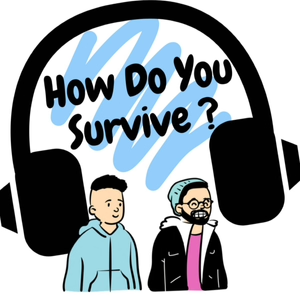
Episode 33: Focus on Targeted Therapies
05/15/24 • 48 min
ABOUT THIS EPISODE
What are Targeted Therapies and how do they work? How and when would they be used in NETs? Dr. Scott Paulson from Baylor Cancer Center in Dallas discusses common questions and concerns about targeted therapies including side effects, dosing and treatment sequencing. Bonus: Dr. Paulson shares how we can learn from Harry Potter’s invisibility cloak in understanding treatment goals with NETs.
MEET DR. SCOTT PAULSON
Dr. Paulson is a medical oncologist and the medical director for the Neuroendocrine Research and Treatment Center at Baylor Charles A. Sammons Cancer Center in Dallas, Texas. He also serves as the co-director of the Gastrointestinal Research Program for the Sarah Cannon Research Institute.
Dr. Paulson earned his medical doctorate at The University of Texas Southwestern Medical School. He took his residency and an internship in internal medicine at Brigham and Women's Hospital in Boston, Massachuests. His fellowship was completed in medical oncology at the University of California, San Francisco.
Dr. Paulson is active in clinical research focused on neuroendocrine tumors as well as cancers of the pancreas, liver, esophagus, stomach, and colon. Dr. Paulson is active in clinical research focused on neuroendocrine tumors as well as cancers of the pancreas, liver, esophagus, stomach, and colon. He currently is an investigator on a clinical trial studying nab-sirolimus, a mTOR inhibitor, which is a type of targeted therapy.
TOP TEN QUESTIONS ABOUT TARGETED THERAPIES FOR NETs:
1. What are targeted therapies? Are they considered chemotherapy? How do they work?
2. What are the different types of targeted therapies for NETs?
3. When and how are targeted therapies used?
4. What side effects might someone have when taking a targeted therapy?
a.Can targeted therapies affect blood sugars or cause diabetes?
b. Can targeted therapies cause one to be immunocompromised?
c. Can targeted therapies affect one’s blood counts?
5. What is the goal of treatment with targeted therapies? (Why would one take these drugs given the potential side effects? Can the side effects be managed?)
6. How do you decide which targeted therapy to recommend for a patient?
7. Can a NET patient take more than one drug in this category? Can the medications be stopped and restarted?
8. What is your approach with dosing?
9. What is your approach with monitoring? What and how often do people need blood work?
10. Does taking a targeted therapy preclude someone from getting another treatment in the future, such as Lutathera/PRRT, or a clinical trial of alpha PRRT?
BONUS: What are the latest advances in targeted therapy? What is the future of targeted therapies?
For more information, please visit https://www.lacnets.org/podcast/33.
For more information, visit LACNETS.org.
ABOUT THIS EPISODE
What are Targeted Therapies and how do they work? How and when would they be used in NETs? Dr. Scott Paulson from Baylor Cancer Center in Dallas discusses common questions and concerns about targeted therapies including side effects, dosing and treatment sequencing. Bonus: Dr. Paulson shares how we can learn from Harry Potter’s invisibility cloak in understanding treatment goals with NETs.
MEET DR. SCOTT PAULSON
Dr. Paulson is a medical oncologist and the medical director for the Neuroendocrine Research and Treatment Center at Baylor Charles A. Sammons Cancer Center in Dallas, Texas. He also serves as the co-director of the Gastrointestinal Research Program for the Sarah Cannon Research Institute.
Dr. Paulson earned his medical doctorate at The University of Texas Southwestern Medical School. He took his residency and an internship in internal medicine at Brigham and Women's Hospital in Boston, Massachuests. His fellowship was completed in medical oncology at the University of California, San Francisco.
Dr. Paulson is active in clinical research focused on neuroendocrine tumors as well as cancers of the pancreas, liver, esophagus, stomach, and colon. Dr. Paulson is active in clinical research focused on neuroendocrine tumors as well as cancers of the pancreas, liver, esophagus, stomach, and colon. He currently is an investigator on a clinical trial studying nab-sirolimus, a mTOR inhibitor, which is a type of targeted therapy.
TOP TEN QUESTIONS ABOUT TARGETED THERAPIES FOR NETs:
1. What are targeted therapies? Are they considered chemotherapy? How do they work?
2. What are the different types of targeted therapies for NETs?
3. When and how are targeted therapies used?
4. What side effects might someone have when taking a targeted therapy?
a.Can targeted therapies affect blood sugars or cause diabetes?
b. Can targeted therapies cause one to be immunocompromised?
c. Can targeted therapies affect one’s blood counts?
5. What is the goal of treatment with targeted therapies? (Why would one take these drugs given the potential side effects? Can the side effects be managed?)
6. How do you decide which targeted therapy to recommend for a patient?
7. Can a NET patient take more than one drug in this category? Can the medications be stopped and restarted?
8. What is your approach with dosing?
9. What is your approach with monitoring? What and how often do people need blood work?
10. Does taking a targeted therapy preclude someone from getting another treatment in the future, such as Lutathera/PRRT, or a clinical trial of alpha PRRT?
BONUS: What are the latest advances in targeted therapy? What is the future of targeted therapies?
For more information, please visit https://www.lacnets.org/podcast/33.
For more information, visit LACNETS.org.
Previous Episode

Episode 32: Focus on Somatostatin Analogues (SSAs)
How do SSAs work? Should all NET patients be on one? What are the side effects? Dr. Edward Wolin from Mount Sinai Health System answers several common questions about the current and future role of somatostatin analogues in NET treatment.
MEET Dr. EDWARD M. WOLIN
Professor of Medicine, Medical Oncology, Icahn School of Medicine Director, Center for Carcinoid and Neuroendocrine Tumors Tisch Cancer Institute, Mount Sinai Health System
Dr. Edward M. Wolin is an internationally renowned authority on neuroendocrine tumors. Dr. Wolin is the Director of the Center for Carcinoid and Neuroendocrine Tumors at the Tisch Cancer Institute at Mount Sinai and Professor of Medicine, Medical Oncology at the Icahn School of Medicine at Mount Sinai.
The multidisciplinary Center for Carcinoid and Neuroendocrine Tumors features a robust research program with clinical trials aimed at finding the most effective treatments, including immunotherapy, biologic agents, targeted radiation therapy, and new approaches in molecular imaging for diagnosis. Dr. Wolin has pioneered innovative therapies with novel somatostatin analogs, mTOR inhibitors, anti-angiogenic drugs, and peptide receptor radiotherapy.
Prior to joining Mount Sinai, Dr. Wolin was Director of the Neuroendocrine Tumor Program at Montefiore Einstein Cancer Center. Previously, he worked for more than two decades with Cedars-Sinai Medical Center in Los Angeles, where he founded and directed one of the largest Carcinoid and Neuroendocrine Tumor Programs in the country, and subsequently directed the Neuroendocrine Tumor Program at University of Kentucky. Dr. Wolin is also the Co-Medical Director for the Carcinoid Cancer Foundation and is on the Carcinoid Cancer Research Grants Scientific Review Committee for the American Association for Cancer Research. He has published in many prestigious journals, including the New England Journal of Medicine and Journal of Clinical Oncology, and is a reviewer for numerous journals, including Journal of Clinical Oncology, Molecular Cancer Therapeutics, Clinical Cancer Research, and The Lancet Oncology.
During Dr. Wolin’s two decades at Cedars-Sinai Medical Center in Los Angeles, he developed a close friendship with LACNETS founder Giovanna Joyce Imbesi. Dr. Wolin was instrumental in the co-founding and development of LACNETS. LACNETS has always been very dear to his heart and he cherishes and honors the memory of Giovanna.
Dr. Wolin earned his medical degree from Yale School of Medicine. He completed both his residency in internal medicine and fellowship in medical oncology at Stanford University Hospital. He was also a clinical fellow at the National Cancer Institute of the National Institutes of Health. Dr. Wolin is board certified in internal medicine and medical oncology.
TOP TEN QUESTIONS ABOUT SOMATOSTATIN ANALOGUES (SSAs) FOR NETS:
1. What are somatostatin analogues (SSAs)? How do they work?
2. When and how are SSAs used?
3. Which SSA should a patient be on? What is the difference? How do you decide?
4. How do you know if a SSA will be helpful? Should ALL NET patients be on a SSA?
5. What about patients whose tumors don’t “light up” on a DOTATATE scan?
6. How long can someone stay on a SSA?
7. What side effects may patients experience from the shot? What can patients do to prevent or manage these symptoms? How might it affect one’s day-to-day ability to work and function? Can I live a “normal life” while taking this medication?
8. If the tumor is growing does this mean the SSA did not work? Do you continue it when patients are treated with another treatment? When do you stop a SSA?
9. What is the future of SSAs? I heard there is a pill that is available in a clinical trial. Ca
For more information, visit LACNETS.org.
Next Episode

Episode 34: NET Treatments: Focus on PRRT
What is PRRT? How is it different from the more commonly used radiation treatment? What are the possible side effects? Dr. Riham El Khouli from the University of Kentucky in Lexington discusses common questions and concerns about PRRT and shares some of the latest advances.
MEET DR. RIHAM EL KHOULI, MD, PHD
Associate Professor of Radiology, UK College of Medicine
Chief, Division of Nuclear Medicine/Molecular Imaging & Radiotheranostics (NM/MI&R)
Director, Radiotheranostics Program
University of Kentucky
Dr. Riham El Khouli, MD PhD, is the director of the Radiotheranostics program and Chief of the division of NM/MI&R at the University of Kentucky and an Associate Professor of Radiology, Nuclear Medicine and Molecular Imaging at UK school of Medicine.
TOP TEN QUESTIONS ABOUT NET TREATMENTS:
1. What is PRRT? How does it work?
2. What is theranostics and what does it mean? What are the terms radiotheranostics, radiopharmaceutical, radioligand therapy, PRRT?
3. How do you determine who is eligible for PRRT?
4. When is PRRT given in one’s treatment journey?
5. How does PRRT differ from other treatments?
6. What are the common side effects of Lutathera?
a. Does Lutathera have long-lasting effects?
b. Would receiving Lutathera affect one’s blood counts?
c. How might Lutathera affect one’s liver function? When, if ever is there concern about liver failure?
7. How might PRRT affect my quality of life and my day-to-day ability to work and function? What is the risk and effects of radiation with receiving Lutathera?
a. What precautions do I need to follow?
b. Can I hug my child? Can I pet my dog?
c. Would receiving Lutathera cause someone to be immunocompromised?
8. How to you decide who should get PRRT?
a. What is peritoneal disease and how effective is PRRT with peritoneal disease?
9. How do you assess the response to PRRT?
10. What advances in PRRT are you most excited about?
Visit https://www.lacnets.org/podcast/34.
For more information, visit LACNETS.org.
If you like this episode you’ll love
Episode Comments
Generate a badge
Get a badge for your website that links back to this episode
<a href="https://goodpods.com/podcasts/the-neuroendocrine-cancer-foundation-podcast-top-10-faqs-with-neuroend-451284/episode-33-focus-on-targeted-therapies-61470093"> <img src="https://storage.googleapis.com/goodpods-images-bucket/badges/generic-badge-1.svg" alt="listen to episode 33: focus on targeted therapies on goodpods" style="width: 225px" /> </a>
Copy




